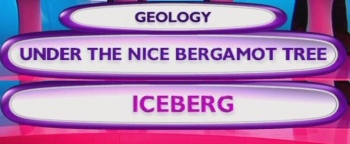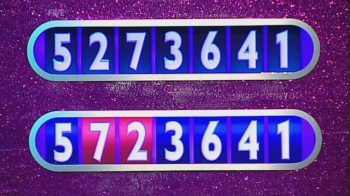Weaver's Week 2009-04-26
Last week | Weaver's Week Index | Next week
Contents |
Wordplay
Lucky Day / Group M for Channel 5, 12.55 weekdays
There was one massive problem with Channel 5's recent Going for Gold revival. It dragged out terribly. There were many positive features: the rounds were all there, the final was bang-bang-bang on the buzzer, and John Suchet had the most wonderful delivery. But none of this altered the fundamental problem: it was a 25-minute show bloated out to fill a one-hour slot. No amount of filling could alter that.
Wordplay addresses this concern in the only possible way: by making sure that every minute is used well. There are fewer minutes in the show: Wordplay runs for 50 minutes, compared to Going for Gold's hour, and that allows only two ad breaks. There are still four contestants, and after a brief introductary chat, it's on with the quizzing. This pleases us.
And, aw, look, they've given the rounds names! How cute! They needn't have bothered, the show begins with Round One, a round of anagrams. Given a clue and an arrangement of letters, the players compete to be first on the buzzer to solve the challenge. For instance, "Puzzle: NGAARMA". One point for a correct answer, an incorrect buzz leads to the player being wallied out of the next question.
Before this round gets under way, the host opens a phone-in competition. It's usually a somewhat more simple version of round one, for instance, "Difficulty: AEYS". It's by the now-familiar mechanic of calls to an 0898 number, from which some callers will be chosen to leave their details, and one of them will go live to air and answer the question.
Round Two follows after a commercial break. It's a round of synonyms, in which a title (of a book, film, television programme) or saying has been broken into parts, and each part substituted with something that has a similar meaning. The alternative parts are then combined with the original subject in a round of extreme complexity. For instance, "Radio: Regrettably, me lacks one hint". And Colin Sell's never at the piano. Two points for a correct answer, but anyone giving a wrong one is wallied out of the next question. Whoever has the lowest score over the first two rounds leaves the programme at this point... except they don't.
After a call-and-lose interlude – answering the last question, setting another one, we reset the scores to zero and continue with Round Three. This is a familiar one, where a phrase is displayed on screen, and the players have to look for a specified word hidden in it. For instance, "Man's name: The pack was an encumbry and heavy". One point for a correct answer, no points for spotting that this was done far better on Catchword twenty years ago. Paul Coia's show was able to show the hidden word in its context, something Wordplay doesn't do.
From Mr. Coia to his wife for Round Four. It's a bit like the missing letters challenges from First Class The Video Quiz: a subject is given, spaces are set aside for letters, and they're slowly filled in as though playing Hangman. For instance: "First-class host: D e _ _ i e / G _ e e n _ _ _ d" Two points for a correct answer, blah blah wallied, lowest score across rounds three and four leaves after this round. Except they don't.
Two players are left for Round Five, in which contestants are asked to use a word to put before or after a list of words given on screen, to make new words. Or phrases. This round reminds us of an easier Lucky Ladders: the additional word can go before or after the original word, and the show mixes and matches compound words (like "Bluebottle") and phrases ("Blue moon") with reckless abandon. They wouldn't get away with such slapdashery on Only Connect's famed Connecting Wall!
There's an ad break looming, and a break for another call-and-lose competition. We then reach Round Six, in which we pla-a-a-a-a-ay-ay Chain Letters. A three-letter word, and a clue, and the contestant must change a letter to make the word fitting the clue. For instance: "Not bright: PULL". Two points for each correct answer, and this is the only solo round, so incorrect answers aren't penalised.
The higher score in the last two rounds goes on to play Round Seven. They're given 90 seconds to solve six puzzles, one from each of the previous rounds. A correct answer to the puzzle earns £50, and puts that round's number in the right place in a combination. The combination requires each of the digits between 1 and 7, once only, so if the player gets all six right, they cannot lose, as there's only the one place for the 7 to go. Solve five of the six, and it's a 50/50 chance: does the 7 go here or there? Fewer correct answers mean progressively less chance of getting the combination.
It's worth while getting the combination: there's a daily prize of £500, and it rolls over from day to day. Just to make sure everything is fair, the safe is opened, and printed on the back of the mock-up cheque is the combination that the player should have entered.
The winner is free to leave. The three defeated contestants aren't: they'll return later in the afternoon for WORDPLAY PLUS, and will play two of the rounds above. The highest score amongst the contestants is allowed to return for the following day's show. There's also another excuse for a call-and-lose contest.
What doesn't work on this show? At heart, Wordplay is still a piece of cheap daytime filler. It's a superior piece of cheap daytime filler, but it still feels like conveyor-belt television, churned out to fill up an awkward hour on the schedule. We can't help feel that it could fall off the air tomorrow and no-one would particularly notice or care.
But let's leave on a positive note, and ask what works? It proceeds at a wonderfully brisk pace: there's none of the languor that affected Going for Gold, and even the patronisingly obvious call-in questions are dealt with at a decent clip. Jenny Powell and Jenni Falconer are experienced hosts; we've only had the chance to see Ms Falconer in action, and she seemed quite capable of filling the gaps in transmission. We could honestly describe it as a bit like Countdown played at rocket speed (ie faster than a snail), and that's intended as good praise.
Mastermind
Semi-final 1 (transmitted 17 April)
It's here! A mere 31 weeks after the first heat, we've finally reached the point where there are only seven more shows to go. And we'll have seen all of tonight's competitors before.
First up is Richard Smyth, taking Scott's Last Expedition. Robert Falcon Scott tried to reach the South Pole before anyone, but was beaten to the punch by Roald Amundsen of Norway; none of the five explorers who reached the pole returned alive. Unlike Scott's expedition, the contender has planned his round well, reaching 15 (0).
Gillian Taylor will tell us about Blake's 7, a science-fiction drama of the late 1970s created by Terry Nation. TV Cream describes the show, which ran for four series, as "preposterous space opera", and its lack of budget shows in the famously wobbly sets. Nothing wobbly about this round, it's another 15 (0).
Shrirang Raddi has been reading The School Stories of P G Wodehouse. These almost count as juvenalia in the Wodehouse canon, they're work he wrote in the early years of the 20th century for magazine publication. In style, they're closer to St Trinians' than Jeeves and Wooster. Another fine round, finishing on 13 (1).
The final contender is Edward Pearce, one of two print journalists to make the second round. He's taking The Popish Plot 1678-81. The basic idea is set out in the opening question: forces loyal to the Pope were alleged to want to kill Charles II and install their puppet on the throne. It was, of course, all a complete fiction, with Titus Oates publishing dossiers of entirely invented material; it's not clear whether he claimed they could launch an armada of destruction within 45 days. Oates would eventually be found guilty of perjury; the contender got every question right, but had longer questions than his opponents, ending on 14 (0).
Mr. Raddi discusses how Wodehouse is tremendously popular in India, but slightly less so in the UK. His other favourite works are Jeeves and Wooster, with which most people agree. Mr. Raddi took the First Kashmir War in the first round, and made two-thirds of his points in the specialist subject. It's only slightly more even tonight, ending on 21 (4).
Mr. Pearce says that Oates had an inferiority complex, because he didn't speak Latin, and was eventually flogged and pilloried five times a year until he was pardoned by William III. The contender took A E Housman last time, scoring a very useful eleven on general knowledge. Again, he bangs them out this week, apart from a brief confusion between Orkneys and Shetlands. He finishes on 26 (1).
Mr. Smyth knows his target is twelve points. The current school of thinking is that Scott didn't quite know what he was doing: he was an amateur compared to Amundsen's ruthlessly professional approach. The contender won last week with British Birds, and scored twelve when he needed ten. It's a similar story this time, as he scores another dozen, ending on 27 (0).
Gillian Taylor took "Romney Marsh" last time and was another person to get two-thirds of her points in the specialist round. Yes, she's the one who writes her own Westerns, and it's only slightly surprising that she's borrowed some of the characters for her own work: in this column's view, Blake's 7 was almost a Western in space years before Firefly. Fans of the latter (and original Dr Who) will appreciate the former. The contender is too young to remember Assize courts, and her round never builds up a tremendous head of steam. It finishes on 23 (0).
And, of course, there was no show last Friday, nor next Friday, because snooker is more important than getting this show finished.
Countdown Update
Since we last discussed Countdown, Kirk Bevins has completed his octochamp run. His total of 925 is the largest eight-game score of all time, beating Julian Fell's record by a single point. We're tempted to say that we may as well go home and declare the series won, but stranger things have happened in a recording studio.
We'll continue, then. Stephen Porritt took over the champion's chair, he recorded three wins (325 pts) before being unseated by Cate Henderson. She won eight games, and though her total was "only" 782, she put together strong performances throughout. Joe Caruna (2 wins, 222), Fiona Chambers (2 wins, 226), and Andrew Pearson (1 win, 172) both passed through the champion's chair in short order, and Mr. Pearson can consider himself unlucky to have met Shane Roberts. His octochamp run amassed 766 points, and he will be another dangerous floater in the finals week.
James Robinson (2 wins, 287) and Patrick McCurdie (1 win, 152) have both collected teapots, and Julie Russell is the current champion. We're rather hoping she comes up against someone called Simon, just so that Gyles Brandreth (who is in Dictionary Corner next week... consider yourselves warned) can reprise his role on Numberwang.
With just 31 games until Finals Week begins, the four octochamps are assured a return, and we suspect that anyone winning four games will be back. Here are the standings:
| 1) Kirk Bevins | 8 wins | 925 pts |
| 2) Cate Henderson | 8 | 782 |
| 3) Shane Roberts | 8 | 766 |
| 4) Neil Zussman | 8 | 758 |
| 5) Stephen Porritt | 3 | 325 |
| 6) Lisa Thomson | 3 | 322 |
| 7) Kate Richardson | 3 | 308 |
| 8) James Robinson | 2 | 287 |
This Week And Next
Simon Amstell has confirmed that he won't be presenting the next series of Never Mind the Buzzcocks, he wishes to spend more time on his stand-up career. Of course, there's no reason why he couldn't present Buzzcocks standing up; equally, this may be an excuse to kill off the programme and find something more entertaining to take its place. It was good in its heyday, but that was something like a decade ago.
Television viewing figures are brought to you by this week's guest Ratings Hunter, Mr. Rolf Harris.
Hello everyone, and look! Signs of the Greater Spotted Britain's Got Talent, and it looks like it's a big Easter bunny, something over 11.2 million. Over there, we can smell the sickly-sweet scent of The Apprentice, just over 8 million lumps of boiled sugar, and 3.1m chunks of fired interview from BBC2. But here's the sad, sad tale of The Colour of Money. After it tangled with Ratings Bear, it got really really ill, and its puny 2.85-million frame didn't stand a chance. We've had to put it down and chase Come Dine With Me (2.4m), Deal or No Deal (2.25m), and Great British Menu (a series best of 2.1m). Can you tell what it is yet? Heh heh heh.
Thanks, Sir Rolf. Britons got Britain's Got Talent: More Auditions attracted 1.5m to ITV2, a repeat on Sunday evening was seen by 835,000, and a high-and-lowlights preview show on Wednesday attracted 615,000. Even Come Dine With Me barely topped 750,000.
A very quiet week for new shows: Golden Balls (5pm weekdays, not STV) leads a revamp of ITV afternoons, and we're already reduced to plugging Celebrity Are You Smarter Than A Ten-Year Old (The Satellite Channel, 8pm Wednesday).
To have Weaver's Week emailed to you on publication day, receive our exclusive TV roundup of the game shows in the week ahead, and chat to other ukgameshows.com readers sign up to our Yahoo! Group.






